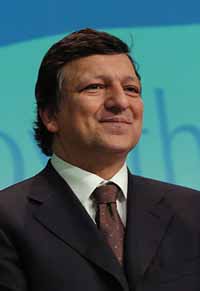Divisions deep between EU and Russia at summit
Russian and European Union leaders sat down for talks Friday at a summit that may only serve to advertise the growing antagonism between Moscow and its Western neighbors.

The talks between President Vladimir Putin and an EU delegation led by German Chancellor Angela Merkel are unlikely to yield a single agreement.
"I am not expecting, honestly, anything spectacular from this meeting," European Commission President Jose Manuel Barroso said Thursday before a dinner marking the start of the summit, which appeared doomed by both sides' inability to resolve vexing energy, trade and security issues.
Merkel said after her arrival in the southeastern Russian city that she did not expect concrete results from the summit, but did expect insight into the disagreements.
"It is always better to talk to each other than to talk about each other," she said.
The Kremlin accuses the West of trying to isolate Russia and meddle in its internal affairs. EU leaders, meanwhile, are concerned about Russia's harsh rhetoric and the government's crackdown on political critics in the run-up to parliamentary elections in December and a presidential vote in March.
"As progress in the Russia-EU relations has stalled, problems in all areas began mushrooming and a rollback began. It's like riding a bike: You stop moving and you fall," said Fyodor Lukyanov, editor of the magazine Russia in Global Affairs.
Tensions between Russia and Europe spiked last month when authorities in EU-member Estonia removed a statue commemorating Red Army soldiers from downtown Tallinn. The removal sparked days of clashes between Estonian police and ethnic Russian protesters, leaving one person killed and hundreds arrested.
A pro-Kremlin, nationalist youth group, meanwhile, blockaded the Estonian Embassy in Moscow and chased the Estonian ambassador. Estonian government Web sites have come under cyber-attack, which Estonian officials suggest was coming from Russia and perhaps been coordinated by Moscow.
"I'm sure this issue will be one of the talking points at the summit," Estonian Defense Minister Jaak Aaviksoo said Thursday in Tallinn. He said initial attacks carried IP numbers from Russian governmental offices, and "there is not sufficient evidence of a government role, but it indicates a possibility."
Estonian and Polish officials discussed canceling the Samara summit, but Germany insisted it go ahead because of the importance of maintaining economic and political ties with Russia.
The EU and Russia also have failed to resolve a Russian ban on Polish meat and plant exports that last year prompted Warsaw to block the start of talks on a new EU-Russia partnership agreement.
Kremlin spokesman Dmitry Peskov said Friday that participants discussed the agreement and the meat dispute over dinner, among other issues, but suggested there were no breakthroughs. On the meat dispute, he said "we are trying to be flexible,but to certain limits, of course."
The two sides also are stalled over energy supplies.
Russia supplies a quarter of Europe's oil and more than two-fifths of its gas _ but many EU nations are concerned about rising energy dependence on Moscow, especially after Russia briefly halted gas supplies to Ukraine and Belarus in 2006 and 2007, resulting in supply shortfalls to EU countries.
The EU has urged Russia to ratify an international energy charter that would oblige it to offer foreign investors fair access to its oil and gas deposits and export pipelines. But the Kremlin has bluntly rejected the pact.
And Putin last week secured pipeline deals to send the bulk of Central Asian oil and gas exports through Russia _ preserving Russia's near-monopoly on the transport of Central Asian gas.
Russia also has failed to honor past commitments. Last year, Moscow promised to stop charging European airlines for flying over Siberia, but the levies continue.
The EU has warned that Moscow's disregard for commitments could jeopardize efforts to bring Russia into the World Trade Organization _ a Kremlin goal the EU had agreed to support.
Russia's record on democracy and human rights under Putin also looms over the Samara summit.
Although Germany has urged the Kremlin to allow a rally Friday and authorities have given approval for a demonstration, activists said they were being harassed even before the summit began.
Police prevented chess champion and Kremlin foe Garry Kasparov and another opposition leader from boarding a flight Friday morning from Moscow to Samara, where they had planned to take part in the protest. Police took their tickets and passports without giving any explanation, aide Marina Litvinovich said.
Kasparov said police detained an activist Thursday at the Samara airport. "They are followed, and they are arrested on their arrival," Kasparov told The Associated Press.
About 15 others have been detained at least briefly, said Anastasiya Kurt-Adzhiyeva, a coordinator for an opposition umbrella group that includes Kasparov's organization.
Russia and the EU also remain divided on security issues.
Putin has criticized U.S. plans for missile-defense system with planned sites in Poland and the Czech Republic, saying Moscow does not believe claims that the system was intended to counter a missile threat from Iran.
Russian generals warned that Moscow could respond by targeting the sites with nuclear missiles, and Moscow threatened to pull out of a Cold War-era accord that banned intermediate-range missiles.
Moscow also refuses to back a draft U.N. Security Council resolution proposed by the U.S. and EU nations endorsing independence for Kosovo under international supervision.
Moscow, a key ally of Serbia, says talks must continue to satisfy the Serbs, who want the province of Kosovo to remain within Serbia's borders.
Subscribe to Pravda.Ru Telegram channel, Facebook, RSS!


